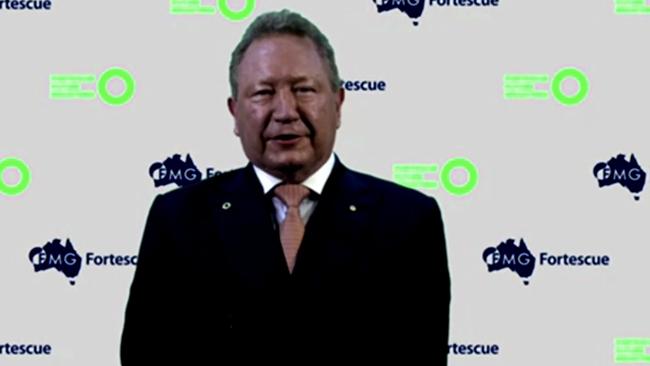Andrew Forrest says ending diesel rebate scheme will help the bush
Facing a storm of criticism over his push to wind back the $7.8bn diesel fuel rebate scheme, Andrew Forrest has come out swinging.

Mining billionaire Andrew Forrest has defended his push for the phase-out of the diesel fuel rebate, “imploring” the federal government to consider the idea and saying the end of the scheme is necessary for Australia’s long term fuel security.
“Global warming is upon us. Wishing for a different result, while doing things the same way, defines insanity. Having mums and dads, hard working Australians, subsidising totally imported fossil fuels for massive companies with their taxpayer dollars, does exactly that,” Dr Forrest said on Tuesday.
The mining magnate’s comments confirm The Australian’s report this week that Dr Forrest had been lobbying government and colleagues in the mining industry for support to phase out rebates for diesel use in the mining and energy sectors.
“What I am proposing is for the Government to start phasing out the diesel fuel rebate between 2025 and 2030 – but only to the largest mining and energy companies,” he said.
“Approximately 70 per cent of the $7.8 billion diesel fuel rebate goes to a handful of major mining and energy companies – costing the taxpayer approximately $5 billion per year and rising. I am acutely aware that farmers and other small businesses rely upon this rebate, and I have never suggested that they should have it taken away.
The rebate refunds excise on diesel fuel for businesses such as mining companies that run vehicles and heavy equipment on private roads.
It also applies to diesel used for electricity generation, such as power plants on remote mining sites, and a partial rebate exists for some heavy transport vehicles that use public roads and also pay a road user charge.

Dr Forrest’s comments come after a wave of criticism from politicians, and mining and farming groups, in the wake of the Australian’s reports this week.
The Minerals Council of Australia said on Monday the proposal was “ridiculous” and would damage industry development in regional areas, and National Farmers Federation chief executive Tony Mahar said removal of the rebate was a “bad policy that would damage livelihoods in country areas”.
Dr Forrest said his proposal would not remove the ability of farmers and smaller regional businesses to claim the rebate, and would instead build new industries in the bush.
“I believe we can build an energy independent, economically stronger and clean Australia. For those that suggest I am trying to hit small business, nothing is further from the truth,” he said.
“To emphasise, creating our own fuel and energy in our own country will have a multiplier effect of creating tens of thousands of jobs and supporting small businesses and regional communities – these same small businesses would also continue to have access to the rebate, but for the first time they would also have a choice of green, pollution free Australian made fuel.”
Above, Andrew Forrest’s full statement on fossil fuel subsidies.
Senior government ministers also attacked the proposal, with Deputy Nationals leader David Littleproud describing the proposal as “gratuitous advice from the sidelines”.
Resources Minister Keith Pitt ruled out any changes to the rebate, saying Fortescue Metals Group – which Dr Forrest founded and which claims about $300m in diesel fuel rebates each year – is free to decide against claiming the rebate in its annual tax returns.
But Dr Forrest said the gradual removal of the tax credit from the country’s biggest users would help spur alternative industries that would strengthen the Australian economy in the long term.
“Australia has an opportunity to create all its own energy and export its sun and its wind to global markets, but only if our government acts quickly to create an environment where renewables can prosper and where the odds are not stacked against them by outdated fossil fuel subsidies,” he said.
“Phasing out the diesel rebate will give the Government the choice of using the money saved to retool Australia to utilise green agriculture, green hydrogen, green ammonia and green electricity instead of rapidly becoming redundant, polluting, imported fossil fuels.
“By 2030, Australians could have a critical choice – we could choose between Australian made, pollution free energy and fuel, and foreign imported, polluting diesel fuel.”


To join the conversation, please log in. Don't have an account? Register
Join the conversation, you are commenting as Logout